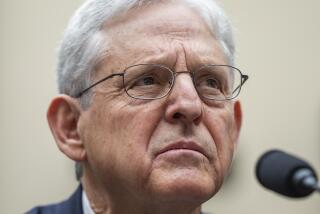Call for House Bank Records Hints at Kiting
- Share via
WASHINGTON — Setting the stage for a constitutional showdown with Congress, the special counsel investigating the House bank scandal Monday renewed his demands for the bank’s complete financial records, saying that there is evidence criminal wrongdoing may have occurred in the form of a “classic check-kiting scheme.”
In a letter sent to Democratic and Republican leaders, Special Counsel Malcolm R. Wilkey rejected complaints by House Speaker Thomas S. Foley (D-Wash.) that the subpoena he issued last week for all the bank’s microfilm records is too broad.
Although the now-closed bank where House members frequently overdrew their checking accounts had a “unique clientele,” its records of deposits, checks and daily balances are “vital” to the investigation, Wilkey wrote.
An offer by the House leadership to provide him with some of the records is “totally inadequate,” Wilkey added. The records offered pertained only to the overdrafts incurred by lawmakers during the 39-month period in which the bank’s operations were examined by congressional auditors.
The April 27 letter, a copy of which was obtained by The Times, appears certain to revive a bitter partisan fight over the checking scandal--a fight that the leadership of both parties had hoped to avoid--when Congress returns from its Easter recess today.
Eager to lay to rest a scandal that already appears to have mortally wounded the political careers of scores of lawmakers from both parties, Foley and House Minority Leader Robert H. Michel (R-Ill.) had hoped to persuade Wilkey to narrow his request.
“I could not in conscience comply with the sweeping and unprecedented scope of documentary request,” Foley wrote in a letter to House members last week, adding that the subpoena is for records on “every single check . . . of each member or former member of the House, whether he or she had overdrafts or not” for the 39-month period ending in 1991.
Indicating that he would support Foley’s efforts to resist the subpoena, Michel told reporters Monday that Wilkey has no right to “invade a member’s privacy” or conduct a “fishing expedition” into the private finances of House members until he provides Congress with “some indication of what suspicions have been raised” by his investigation.
In his letter, however, Wilkey characterized his investigation as “no different from any inquiry into a troubled financial institution after it is closed.” Any “meaningful examination” of the bank’s operations would be impossible without access to all of the records of House members’ financial transactions during the 39-month period under review, he added.
Although Foley and other Democratic leaders concede that some of the 325 lawmakers who wrote bad checks abused the bank’s lax accounting practices, they have also repeatedly asserted that the scandal has been overblown because no laws were broken and no taxpayer money was lost because of the bank’s practice of extending penalty-free overdraft protection to members.
But in a strongly worded rejection of this benign characterization of the scandal, Wilkey said that the House leadership cannot be certain that no public money was involved and added that the preliminary investigation he was appointed by the Justice Department to conduct may have already turned up evidence of criminal activity in the form of check-kiting, the practice of using bad checks to cover other accounts.
“It has been claimed that there have been no violations of the law. . . . How can anyone possibly make such a claim?” Wilkey asked, noting that an investigation conducted by the House Ethics Committee did not focus on “criminal” violations.
“As a matter of fact,” he added, “our preliminary inquiry has already unearthed evidence that a classic check-kiting scheme may have occurred.”
Wilkey, a retired federal judge, did not elaborate on the charge in his letter, and he declined requests for an interview.
But a senior congressional aide said that it was clear from the sharp tone of the letter that Wilkey is “not inclined to be conciliatory,” and that the scandal Foley and other leaders had hoped to avoid is likely to evolve into a constitutional confrontation with the Justice Department.
Among the principles now at issue, House legal experts said, is the constitutional question of separation of powers and the extent to which an agency of the executive branch can go in examining the records of the legislative branch.
“Wilkey’s request is unprecedented in its sweep and scope,” another leadership aide said.
But U.S. Atty. Gen. William P. Barr, who appointed Wilkey to investigate the bank, defended the subpoena in a television interview Sunday.
“When there are widespread abuses in any financial institution, the normal course in a criminal investigation is to gain access to that institution’s transactional records,” Barr said on ABC-TV’s “This Week With David Brinkley.”
He added that the Constitution’s speech and debate clause, which protects legislators from interference with official functions, does not appear to apply in an inquiry into alleged financial wrongdoing.
“When it comes to these kinds of transactions, they’re no different than anybody else,” Barr said.
Times staff writer Ronald J. Ostrow contributed to this story.
More to Read
Get the L.A. Times Politics newsletter
Deeply reported insights into legislation, politics and policy from Sacramento, Washington and beyond. In your inbox twice per week.
You may occasionally receive promotional content from the Los Angeles Times.









